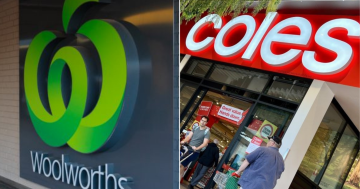
The Federal Government is hoping to make the voluntary food and grocery code mandatory. Photo: File.
Public and community counsel is being sought over the shape of a mandatory food and grocery code Labor wants to introduce.
The Federal Government has released exposure drafts of a stronger code and amendments to the Competition and Consumer Act 2010 for consultation.
It comes as the Australian Competition and Consumer Commission (ACCC) has launched proceedings against Woolworths and Coles for allegedly misleading consumers through discount pricing claims on hundreds of common supermarket products.
Assistant Minister for Competition and for Treasury, Andrew Leigh, said creating a new code was part of the government’s commitment to supporting a competitive and sustainable food and grocery sector that worked for Australian families and farmers.
“The government’s economic plan is all about easing the cost of living for Australians,” he said.
“The new code will help to ensure our supermarkets are as competitive as they can be so Australians get the best prices possible.
“Strengthening the Food and Grocery Code is only one part of the government’s broad competition reform agenda, which includes an ACCC supermarket inquiry, progress on the most significant merger reforms in Australia in almost 50 years, consultation on reforming non‑compete clauses, funding for CHOICE to conduct quarterly price monitoring and working with the states and territories to revitalise National Competition Policy.”
The new code will see Aldi, Coles, Woolworths and Metcash subject to multi‑million‑dollar penalties for serious breaches and higher infringement notice penalties for alleged breaches of the Food and Grocery Code and other industry codes.
According to the government, the new code would increase protection for suppliers by introducing strengthened dispute resolution arrangements and new obligations to protect suppliers from retribution. This would be complemented by the creation of an anonymous supplier and whistleblower complaints pathway through the ACCC.
If accepted, the new code would fully implement the recommendations of former Labor minister Craig Emerson’s independent review and would begin on 1 April 2025.
Legislation will be introduced into parliament later this year.
Before then, the government wants to know what the public thinks of its plans.
Submissions on the exposure draft of the mandatory Food and Grocery Code are open until 18 October 2024.
Submissions on the exposure draft of amendments to the Competition and Consumer Act 2010 are open until 4 October 2024.
Prime Minister Anthony Albanese said Australians were “rightly outraged” at the behaviour of the supermarkets with almost 500 incidents of alleged bogus discounts to be prosecuted through ACCC action.
“When shoppers go to their checkout, they expect in the supermarket, where they see the sign of ‘specials’ for it to actually be cheaper,” Mr Albanese said.
“But what is alleged here is that supermarkets have increased their price by a dollar for example, then decreased by 50 cents, so it’s 50 cents more expensive than it was just a short period earlier.
“And yet they’re pretending that somehow customers are getting a bargain. Now that’s not the Australian way. It’s not honest, it’s not fair dinkum. And that’s why the ACCC are taking this strong action.
“It’s also why we are changing the voluntary code of conduct, which existed under the former government, into a mandated code of conduct after the recommendations by Craig Emerson.”
Mr Albanese suggested the prosecution could result in more than a slap on the wrist for the big two supermarkets.
“What we’ve done is… to give the ACCC every encouragement to get in there and use powers at its disposal,” he said. “They’re taking Woolworths and Coles to court. There are significant fines for every single breach of every product [that] will be available.
“And the ACCC made it clear they’ll be asking for significant penalties to be imposed if the court case is successful.
“The mandated code of conduct is about putting downward pressure on prices by making sure the game is up when it comes to the supermarkets, these big players saying, ‘Oh, just trust us, we’ll have a voluntary code and we’ll do the right thing’.
“Quite clearly, it hasn’t delivered, which is why we’re mandating the code of conduct, which is why we are also introducing changes to the consumer protection legislation to make sure customers are looked after.”
Original Article published by Chris Johnson on Riotact.
















